|
|
|
Sort Order |
|
|
|
Items / Page
|
|
|
|
|
|
|
| Srl | Item |
| 1 |
ID:
132774
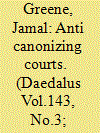

|
|
|
|
|
| Publication |
2014.
|
| Summary/Abstract |
Within U.S. constitutional culture, courts stand curiously apart from the society in which they sit. Among the many purposes this process of alienation serves is to "neutralize" the cognitive dissonance produced by Americans' current self-conception and the role our forebears' social and political culture played in producing historic injustice. The legal culture establishes such dissonance in part by structuring American constitutional argument around anticanonical cases: most especially "Dred Scott v. Sandford," "Plessy v. Ferguson," and "Lochner v. New York." The widely held view that these decisions were "wrong the day they were decided" emphasizes the role of independent courts in producing them and diminishes the roles of culture in creating them and of social movements in overcoming them. This essay argues for approaching these decisions as ordinary products of political culture rather than extraordinary products of judicial malfeasance. Doing so honors those who struggled for progress and may invigorate our political imagination in the present.
|
|
|
|
|
|
|
|
|
|
|
|
|
|
|
|
| 2 |
ID:
132772
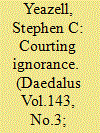

|
|
|
|
|
| Publication |
2014.
|
| Summary/Abstract |
Most of the United States' judicial work takes place in the country's state trial courts. These tribunals preside over everything from traffic tickets to murder trials, from routine debt collection to massive environmental torts. Given their expansive role, the manner in which these courts function is of immense significance. But ultimately, we know very little about these institutions. Our ignorance flows both from trivial bureaucratic turf battles and from deeply rooted principles of local government, a phenomenon I have called "data federalism." In the last few decades, we have begun to form a partial image of the activities of these organs of government; but we know almost nothing about their past, and the little we do know suggests the dangers of extrapolation. This essay explores the extent of our ignorance of state trial courts and the difficulties of overcoming it.
|
|
|
|
|
|
|
|
|
|
|
|
|
|
|
|
| 3 |
ID:
132773
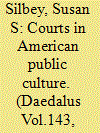

|
|
|
|
|
| Publication |
2014.
|
| Summary/Abstract |
In American public imagination, courts are powerful but also impotent. They are guardians of citizens' rights but also agents of corporate wealth; simultaneously the least dangerous branch and the ultimate arbiters of fairness and justice. After recounting the social science literature on the mixed reception of courts in American public culture, this essay explains how the contradictory embrace of courts and law by Americans is not a weakness or flaw, nor a mark of confusion or naïveté. Rather, Americans' paradoxical interpretations of courts and judges sustain rather than undermine our legal institutions. These opposing accounts are a source of institutional durability and power because they combine the historical and widespread aspirations for the rule of law with a pragmatic recognition of the limits of institutional practice; these sundry accounts balance an appreciation for the discipline of legal reasoning with desires for responsive, humane judgment.
|
|
|
|
|
|
|
|
|
|
|
|
|
|
|
|
| 4 |
ID:
132751
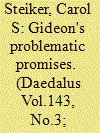

|
|
|
|
|
| Publication |
2014.
|
| Summary/Abstract |
The landmark case of "Gideon v. Wainwright" (1963) ensured the right of criminal defendants across the country to the effective assistance of counsel, but the overwhelming consensus is that the promise of "Gideon" has not been kept. Although there are significant differences in the delivery of indigent defense services across the country, there are four general reasons for the failure of "Gideon" that obtain across every jurisdiction and collectively cover much of the explanatory terrain: 1) its mandate is inadequately and precariously funded; 2) institutional impediments have impinged on the independence, training and oversight, and advocacy culture of indigent defense counsel; 3) legal remedies for ineffective assistance of counsel are often inadequate, inaccessible, or both; and 4) the ubiquitous practice of plea bargaining shields inadequate representation from view or remedy. Vindicating the right of poor people to effective representation in criminal cases remains a daunting but enormously important task.
|
|
|
|
|
|
|
|
|
|
|
|
|
|
|
|
| 5 |
ID:
132761


|
|
|
|
|
| Publication |
2014.
|
| Summary/Abstract |
Over the past half-century, the number of cases entering American federal and state courts has multiplied. But, largely unobserved by the public, the percentage of those cases that are disposed of by trial has steadily decreased. In recent decades, as the increase in filings has leveled off but the percentage of cases reaching trial has continued to fall, the absolute number of trials has decreased as well. Conducting trials is a shrinking portion of what judges do. The effects of this turn away from trials on judges, on litigants, and on public perceptions of the legal system remain to be explored.
|
|
|
|
|
|
|
|
|
|
|
|
|
|
|
|
| 6 |
ID:
132755
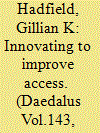

|
|
|
|
|
| Publication |
2014.
|
| Summary/Abstract |
Struggling to navigate a world that is increasingly shaped by legal rules and obligations, most ordinary Americans lack real access to courts. Often this means simply forgoing legal rights and entitlements or giving up in the face of claims of wrongdoing. Among those who cannot avoid courts-such as those facing eviction, collection, or foreclosure and those seeking child support, custodial access, or protection from violence or harassment-the vast majority (as many as 99 percent in some cases) find themselves in court without any legal assistance at all. There are many reasons for this lack of meaningful access, including the underfunding of courts and legal aid, but perhaps the most fundamental is the excessively restrictive American approach to regulating legal markets. This regulation, controlled by the American legal profession and judiciary, closes off the potential for significant reductions in the cost of, and hence increases in access to, courts. Unlike the problem of funding, that is a problem that state courts have the power, if they can find the judicial will, to change.
|
|
|
|
|
|
|
|
|
|
|
|
|
|
|
|
| 7 |
ID:
132743
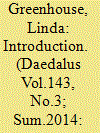

|
|
|
|
|
| Publication |
2014.
|
| Summary/Abstract |
This volume is both prequel and sequel. In 2008, Dædalus published an issue entitled "On Judicial Independence," exploring from a variety of perspectives the de½nition of that term, as well as ageold
and newly emergent threats to the ability of judges to do their work without undue constraint. Six years later, we both carry that story forward and shift the analytical frame to consider courts them selves: their past and ongoing evolution, and the work that a democracy can reasonably expect them to do. To write about courts is to write about political theory, about lawyering, about ½scal priorities, and about social welfare, as well as about courts' dependence on and independence from the body politic. The subject evokes a great variety of conversations, from the highly theoretical to the nitty gritty of service delivery for human needs in all their man - ifestations. Discussions of courts, at least in the United States, bring lawyers rapidly into view, along with criminal defendants, civil litigants, administrative agencies, budgets, public ½nancing, and popular opinion.
|
|
|
|
|
|
|
|
|
|
|
|
|
|
|
|
| 8 |
ID:
132775
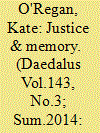

|
|
|
|
|
| Publication |
2014.
|
| Summary/Abstract |
In a society such as South Africa in which the past has been deeply unjust, and in which the law and judges have been central to that injustice, establishing a shared conception of justice is particularly hard. There are four important strands of history and memory that affect the conception of justice in democratic, post-apartheid South Africa. Two of these, the role of law in the implementation of apartheid, and the grant of amnesty to perpetrators of gross human rights violations, are strands of memory that tend to undermine the establishment of a shared expectation of justice through law. Two others, the deeprooted cultural practice of justice in traditional southern African communities, and the use of law in the struggle against apartheid, support an expectation of justice in our new order. Lawyers and judges striving to establish a just new order must be mindful of these strands of memory that speak to the relationship between law and justice.
|
|
|
|
|
|
|
|
|
|
|
|
|
|
|
|
| 9 |
ID:
132753
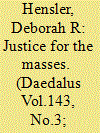

|
|
|
|
|
| Publication |
2014.
|
| Summary/Abstract |
Traditionally, disputes over injury compensation that were brought to court involved one or a few plaintiffs and defendants and were processed individually. The risk and expense of such litigation meant that most victims of legally cognizable injuries never came through the courthouse doors. The modern global economy, however, has vastly increased the potential for mass harms and losses, and modern mass media have created felicitous circumstances for mass claiming. Aggregated mass litigation blasts open the courthouse doors for individuals who might otherwise find them closed. Aggregation benefits some but disadvantages others. Class action rules attempt to mitigate these conflicts, but such procedures do not apply to aggregate non-class litigation. It is time for courts to adopt rules and practices that recognize the realities of such litigation.
|
|
|
|
|
|
|
|
|
|
|
|
|
|
|
|
| 10 |
ID:
132760
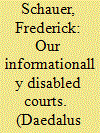

|
|
|
|
|
| Publication |
2014.
|
| Summary/Abstract |
In order to carry out their functions of deciding particular cases and developing legal rules and principles, courts need information: not just information about the law, but also factual information about the particular matter in controversy and about the world in general. The way in which courts are structured, however, makes it more difficult for them to obtain the information they need than it is for most other public decision-making institutions. As the world becomes more complex, and as sophisticated scientific, technical, and financial information becomes more central to litigation and to the judicial function, the systemic disabilities of the courts in obtaining the information they need become more apparent and increasingly more problematic.
|
|
|
|
|
|
|
|
|
|
|
|
|
|
|
|
| 11 |
ID:
132745
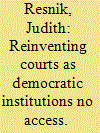

|
|
|
|
|
| Publication |
2014.
|
| Summary/Abstract |
Eighteenth-century constitutional commitments guaranteeing rights-to-remedies were shaped when members of the propertied classes were the prototypical litigants and governments' criminal justice systems were nascent. Twentieth-century egalitarian norms expanded the imagination of what justice could produce, and courts turned into sites of democracy. The particular and peculiar practices of adjudication produce, redistribute, and curb power among disputants who disagree in public about the import of legal rights. But new procedures-alternative dispute resolution (ADR)-encourage, and sometimes require, disputants to mediate or to arbitrate disputes privately as a predicate to or in lieu of using the public forum of courts. Some initiatives delegate adjudication to administrative tribunals, and others outsource binding decision-making to private providers. The resulting fragmentation and privatization of adjudication have profound implications for the newly minted democratic character of courts. The durability of courts as active and disciplined sites of public exchange ought not to be taken for granted. Like other venerable institutions of the eighteenth century-such as the postal service and the press, which served in parallel fashion to disseminate information and support democratic competency-courts are vulnerable.
|
|
|
|
|
|
|
|
|
|
|
|
|
|
|
|
| 12 |
ID:
132749
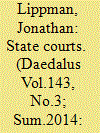

|
|
|
|
|
| Publication |
2014.
|
| Summary/Abstract |
In New York, millions of civil litigants each year fight for the necessities of life without the aid of a lawyer because they are unable to afford one. While the state courts strive to provide access to justice for all constituents, this ideal becomes a promise unfulfilled due to the lack of available civil legal services for low-income populations. In this essay, I discuss access to justice in the state courts from the perspective of my role as Chief Judge of the State of New York. I examine the enormity of the unmet need in New York and around the country and discuss the measures I have taken as head of the New York State court system to address the crisis. These efforts have resulted in a substantial increase in state funding for civil legal services, the establishment of the Task Force to Expand Access to Civil Legal Services in New York, annual hearings in each of New York's four Judicial Departments, and the development of programs designed to spur the legal community (including law students) to greater involvement in pro bono work.
|
|
|
|
|
|
|
|
|
|
|
|
|
|
|
|
| 13 |
ID:
132756
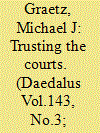

|
|
|
|
|
| Publication |
2014.
|
| Summary/Abstract |
In recent years, state courts have suffered serious funding reductions that have threatened their ability to resolve criminal and civil cases in a timely fashion. Proposals for addressing this state court funding crisis have emphasized public education and the creation of coalitions to influence state legislatures. These strategies are unlikely to succeed, however, and new institutional arrangements are necessary. Dedicated state trust funds using specific state revenue sources to fund courts offer the most promise for adequate and stable state court funding.
|
|
|
|
|
|
|
|
|
|
|
|
|
|
|
|
| 14 |
ID:
132752
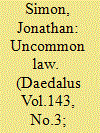

|
|
|
|
|
| Publication |
2014.
|
| Summary/Abstract |
This essay explores the role that U.S. criminal courts play in shaping the uniquely punitive social order of the United States. U.S. courts have long been defined against the common law of England, from which they emerged. In this essay, I consider the English legacy and suggest that while the United States does draw heavily from common-law traditions, it has also innovated to alter them, a process that has established a criminal justice system even more punitive than that of England.
|
|
|
|
|
|
|
|
|
|
|
|
|
|
|
|
| 15 |
ID:
132750
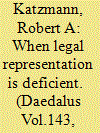

|
|
|
|
|
| Publication |
2014.
|
| Summary/Abstract |
When the quality of lawyering is inadequate, courts are frustrated in their adjudicative role. Nowhere is this more apparent than in cases involving immigrants hoping to fend off deportation. As an appellate judge on a court whose immigration docket reached 40 percent of our caseload, I have too often seen deficient legal representation of immigrants. Although courts are reactive, resolving cases before them, judges can systematically promote the fair and effective administration of justice. With the aid of some outstanding legal talent, I created the Study Group on Immigrant Representation to help address the immigrant representation crisis. Our work has encompassed a variety of activities, including: publishing symposia; conducting studies documenting the enormity of the problem and proposing solutions; creating initiatives to expand pro bono representation; facilitating the first local government funding of direct immigrant legal services; creating legal orientation programs for immigrants; and developing the Immigrant Justice Corps, an innovative fellowship program. These initiatives represent some steps towards easing the crisis in immigrant legal representation.
|
|
|
|
|
|
|
|
|
|
|
|
|
|
|
|
|
|
|
|
|